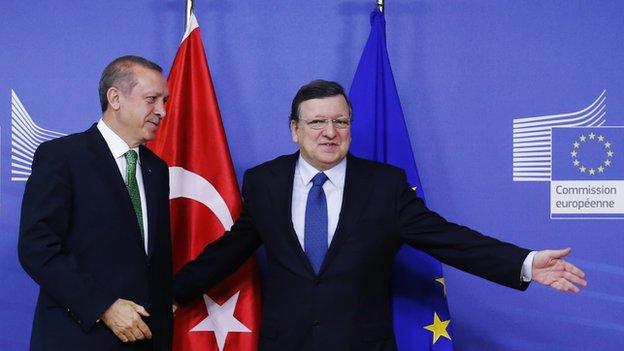Turkey election: The price of Erdogan's popularity
- Published
Mark Lowen reports from Istanbul: ''Erdogan dominates the campaign''
On the banks of the Bosphorus, the song blares out: "a new sun has risen above my country, a new hope for my nation, with a strong will and a big heart… Recep Tayyip Erdogan".
His supporters clap in rhythm. The tune is catchy and, like the man himself, a huge hit for his hordes of adoring fans.
Turkey's prime minister for the last 11 years, Mr Erdogan is aiming for new heights: victory in this Sunday's presidential election.
The post, previously chosen by parliament and largely ceremonial, will be put to a popular vote for the first time and Mr Erdogan has said he wants to enhance its powers.
Across Istanbul, his face stares out on flags plastered over buildings, his posters adorn the streets.
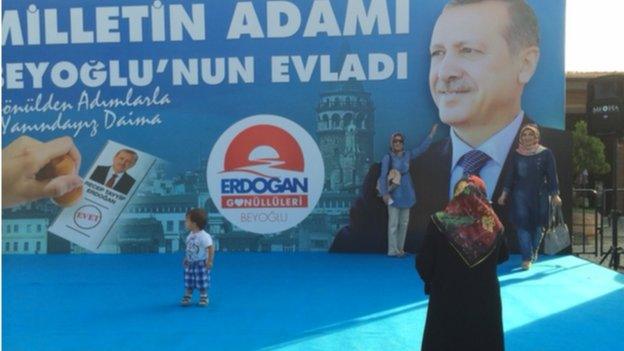
Mr Erdogan has stepped up accusations of "betrayal" against his political opponents in the run-up to Sunday
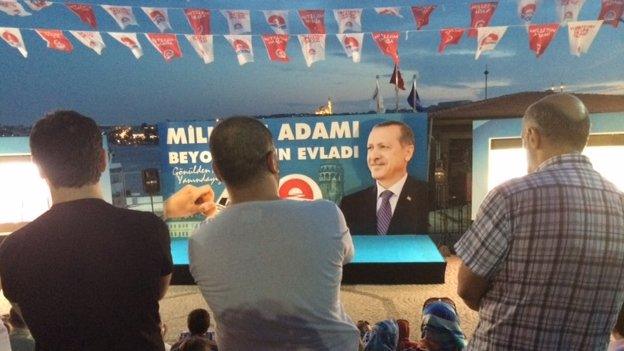
Despite concerns about his perceived human rights record, Mr Erdogan is presidential favourite in the polls
Airtime for Erdogan
Mr Erdogan is dominating this campaign, vastly outspending his rivals, the opposition-backed Ekmeleddin Ihsanoglu and Selahattin Demirtas, a young Kurdish candidate.
The state-controlled media are accused of favouring the prime minister in airtime.
Over two days in July, Turkey's state broadcaster TRT was found to have given him 533 minutes of airtime, compared with three minutes and 24 seconds for Mr Ihsanoglu and just 45 seconds for Mr Demirtas.
The election has become a referendum on Mr Erdogan, an Islamist-rooted politician whose support base lies in Turkey's conservative, pious heartland.
Hated by his critics for mixing religion with politics in a constitutionally secular country, his wife wears a headscarf - previously unthinkable for a prime minister's spouse - and his firebrand rhetoric appeals to his religious support base.
"He did good things in Turkey for everyone - for women like me" says Kubra Sasi Seo Lecoq, a local member of Mr Erdogan's party, the AKP.
"Before, women wearing a scarf couldn't work in places. I had problems with it at university. Now there is freedom for us. Before Erdogan, there was no stability in Turkey. But now all is good - politically and economically."
'Not the man I knew'
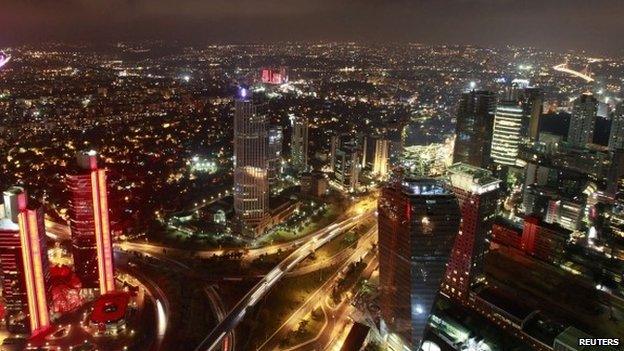
Turkey's predicted 4% economic growth next year is set to outstrip the OECD average by 1.2%
Istanbul's skyline tells of the prime minister's success.
Cranes are dotted everywhere, building new office blocks and hotels. Gleaming towers show off the economic success of the past decade.
Turkey, a financial basket-case at the turn of the century, now has the world's 15th largest economy, its GDP per person tripling under Mr Erdogan.
New infrastructure, hospitals and schools have given this country huge confidence.
The once all-powerful military, which has brought down four governments since 1960, has been tamed.
Turkey achieved EU candidate status in 2005.
And a peace process is ongoing with the Kurdish PKK party, after a decades-long conflict that killed 40,000 people.
But latterly, the prime minister's profile has soured.
After leaked conversations alleged massive corruption at the highest levels of Turkish politics, implicating Mr Erdogan himself, he attempted to ban Twitter and YouTube, both overruled by the constitutional court.
He turned on all perceived critics, especially on followers of a Turkish Islamic scholar, Fetullah Gulen, whom he accuses of running a "parallel state". Hundreds of police officers and judges have been sacked for apparent membership of the Gulen movement.
Critics say Mr Erdogan is simply using a smokescreen to avoid fraud charges.
Cemal Ussak was at school with the prime minister but is now a leading follower of Mr Gulen.
He says Mr Erdogan's line that the Gulenists are plotting a "parallel state" is nonsense.
"The way he talks about us, the words he uses, reminds me of how Hitler spoke about the Jews", Mr Ussak tells me.
"There is not a shred of evidence against us. It's very hard for me to hear him speak like this. It's not the Erdogan I knew."
'Master of perceptions'
Once embraced by the West as a prime minister who could combine Islam and democracy, Mr Erdogan has since drifted into isolation.
Relations with Europe and the US have deteriorated, and tensions were exacerbated recently when he accused Israel of "genocide… reminiscent of the Holocaust" during the Gaza crisis.
His backing for the Muslim Brotherhood in Egypt has put him in conflict with the new government in Cairo.
His support for the Syrian opposition has led to charges that he is allowing jihadi groups to flood Turkey's borders.
A once-stated policy of "zero problems with neighbours" is now much ridiculed by those who see only hostility.
"He's a master at managing perceptions," says Murat Yetkin, editor-in-chief of the newspaper Hurriyet Daily News.
"So he's the victim and there are always enemies - foreign and interior - who are trying to undermine his power and topple him. And he uses the media in a very effective way.
"He knows that his grassroots are not interested in social media. They watch mainstream TV channels and they tend to rely on what he says."
The turning-point in Mr Erdogan's premiership was in June 2013, when protests began against a construction project that would have destroyed Istanbul's Gezi park.
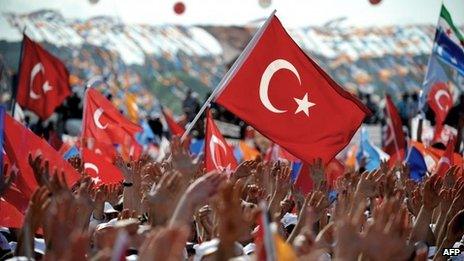
Mr Erdogan's rallies in June quelled protests but he is still seen as authoritarian
Police were sent in to clear those occupying the space with tear gas.
Days of violent demonstrations ensued across the country, an environmental movement morphing into rage against Mr Erdogan's perceived authoritarianism and human rights abuses. Turkey has more journalists in jail than any other country.
'Man of the nation'?
The prime minister dismissed those involved as "riff-raff".
Eight died, including a 14-year-old, Berkin Elvan, caught up in the protests when he went out to buy bread one morning.
Hundreds of thousands rallied at his funeral but Mr Erdogan called him a "terrorist".
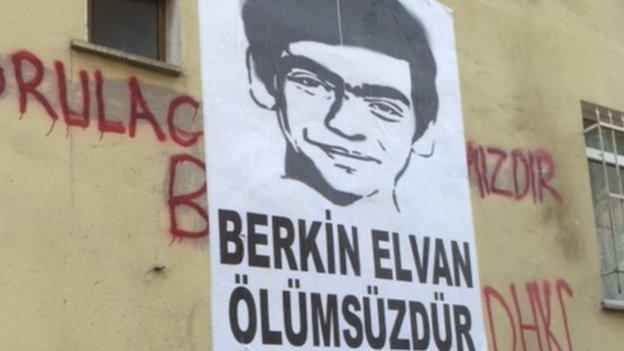
Berkin Elvan became a symbol of heavy-handed police tactics when he died tragically while out buying bread in June last year
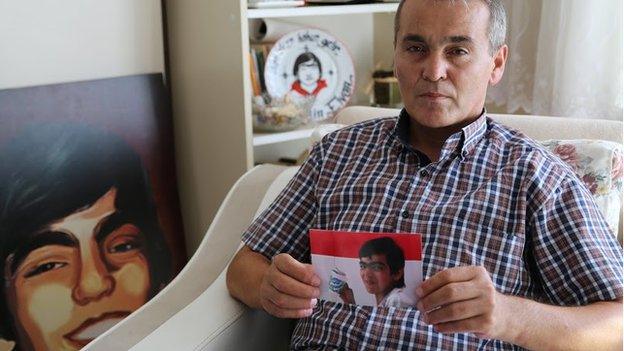
Sami Elvan blames Prime Minister Erdogan for his son's death in 2014
Berkin's father, Sami, shows me the place where his son was shot in the head by a police tear-gas canister.
"I blame Erdogan for his death," Mr Berkin says, a vacant look in his eyes.
"If it weren't for him, my son would be alive. He divides us all. Now I try simply to go on living - but it's so hard without Berkin."
Back on the Bosphorus, plasma screens show glitzy Erdogan campaign videos. "I love him," says Mehmet, a student, "he has made us strong."
But Turkey's most successful prime minister of modern times has also polarised this nation.
The cult of Erdogan is a powerful force, and Sunday could see its crowning glory.
- Published11 July 2014
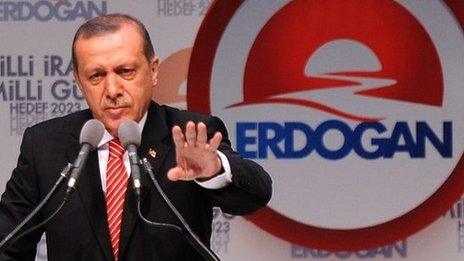
- Published1 July 2014
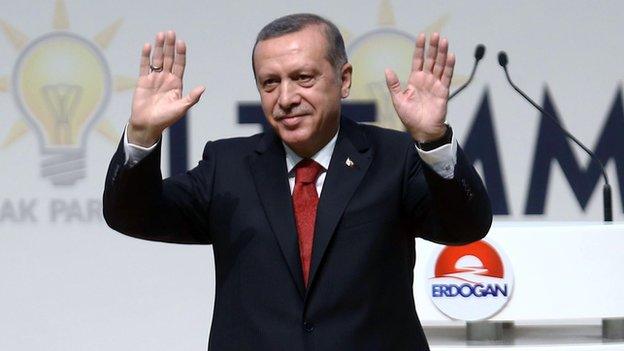
- Published15 March 2014
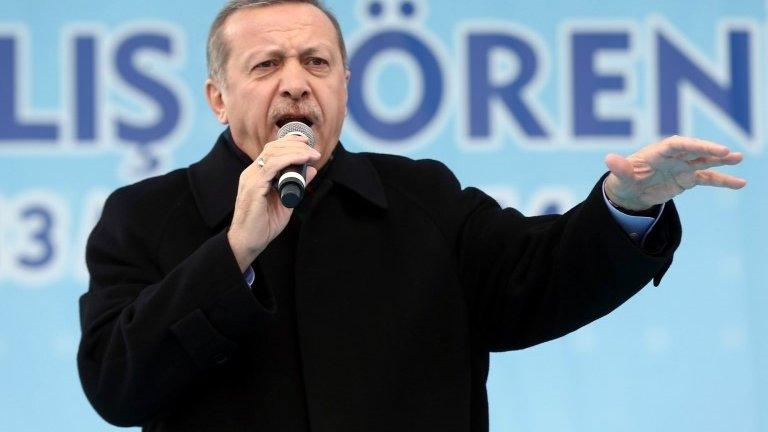
- Published21 January 2014
